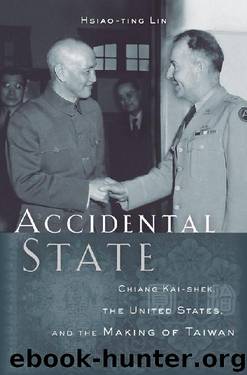Accidental State by Hsiao-ting Lin

Author:Hsiao-ting Lin [Lin, Hsiao-ting]
Language: eng
Format: epub
ISBN: 9780674969629
Publisher: Harvard University Press
Published: 2016-03-06T16:00:00+00:00
8.1 General Douglas MacArthur met with Chiang Kai-shek and his top military brass in Taipei. MacArthur’s visit to Taiwan on July 31, 1950, boosted Nationalist morale and strengthened Chiang Kai-shek’s legitimacy. (Courtesy of the KMT Party History Institute)
Soon after MacArthur’s visit, a group led by General Alonzo Fox, MacArthur’s deputy chief of staff, conducted a three-week survey of the Nationalist military on Taiwan to determine their needs. The report of this “Fox Survey” mission trumpeted that Chiang’s army was an important backup for the Seventh Fleet, capable of repulsing a Communist landing given sufficient aid and proper military advice.20 Although the Fox report recommended a $158.2 million military aid package, nothing materialized. It was not until the Chinese Communists first intervened in Korea in late 1950 that renewed military assistance to Taiwan was seriously deliberated in Washington.
MacArthur’s visit delighted Chiang Kai-shek as much as it annoyed the upper echelons in Washington, who were alarmed by what they now perceived to be the two men’s joint effort to determine U.S. policy. Truman sent his senior advisor Averell Harriman to meet the SCAP chief in Tokyo two days after he returned from Taiwan. Harriman’s message to the general was straightforward: “leave Chiang Kai-shek alone.” Fearing that Chiang might genuinely launch a war with mainland China, the president passed on his verbal promise via Harriman to the effect that as long as MacArthur waged war only against North Korea, he would be given whatever he wanted.21 Truman’s apprehension further deepened, when, shortly thereafter, MacArthur’s address to the Veterans of Foreign Wars annual conference was published on August 25. In his address, the general reemphasized that Taiwan was an unsinkable aircraft carrier and submarine tender, from which a hostile power could overshadow the central and southern flank of the United States frontline position in Asia. This statement was not new, but it doubtlessly conflicted with Truman’s recent policy that U.S. protection of Taiwan was only a temporary expedient deriving from the conflict in Korea. Politically, the president was enraged at the general for handing the “Acheson-haters” at home an argument behind which they could gather their forces for an attack.22 MacArthur’s seemingly unilateral actions equally unnerved America’s European allies, who wanted to keep the war on the peninsula hermetically sealed from Mao Zedong and Chiang Kai-shek lest Beijing start taking “hostages,” particularly Hong Kong and French Indochina. The British were also worried, viewing the presence of the SCAP chief in Taiwan as a sign of Washington’s “lack of all direction in its policy toward China,” as well as of “internal difficulties” in the Truman administration.23
As discord between Washington and London over the Far Eastern situation was about to heat up, chief policy planners in the State Department and Whitehall were endeavoring to work out mutually acceptable strategies to deal with the thorny Taiwan issue. In September 1950, the United States, Great Britain, and France settled on a unified approach in the United Nations on the status of Taiwan and the Nationalist Chinese representation. They
Download
This site does not store any files on its server. We only index and link to content provided by other sites. Please contact the content providers to delete copyright contents if any and email us, we'll remove relevant links or contents immediately.
| Africa | Americas |
| Arctic & Antarctica | Asia |
| Australia & Oceania | Europe |
| Middle East | Russia |
| United States | World |
| Ancient Civilizations | Military |
| Historical Study & Educational Resources |
Cat's cradle by Kurt Vonnegut(15343)
Pimp by Iceberg Slim(14494)
4 3 2 1: A Novel by Paul Auster(12382)
Underground: A Human History of the Worlds Beneath Our Feet by Will Hunt(12094)
The Radium Girls by Kate Moore(12022)
Wiseguy by Nicholas Pileggi(5775)
The Fire Next Time by James Baldwin(5434)
Perfect Rhythm by Jae(5400)
American History Stories, Volume III (Yesterday's Classics) by Pratt Mara L(5303)
Paper Towns by Green John(5184)
Pale Blue Dot by Carl Sagan(5002)
A Higher Loyalty: Truth, Lies, and Leadership by James Comey(4958)
The Mayflower and the Pilgrims' New World by Nathaniel Philbrick(4498)
The Doomsday Machine by Daniel Ellsberg(4489)
Killers of the Flower Moon: The Osage Murders and the Birth of the FBI by David Grann(4447)
The Sympathizer by Viet Thanh Nguyen(4387)
Too Much and Not the Mood by Durga Chew-Bose(4344)
The Borden Murders by Sarah Miller(4318)
Sticky Fingers by Joe Hagan(4192)
